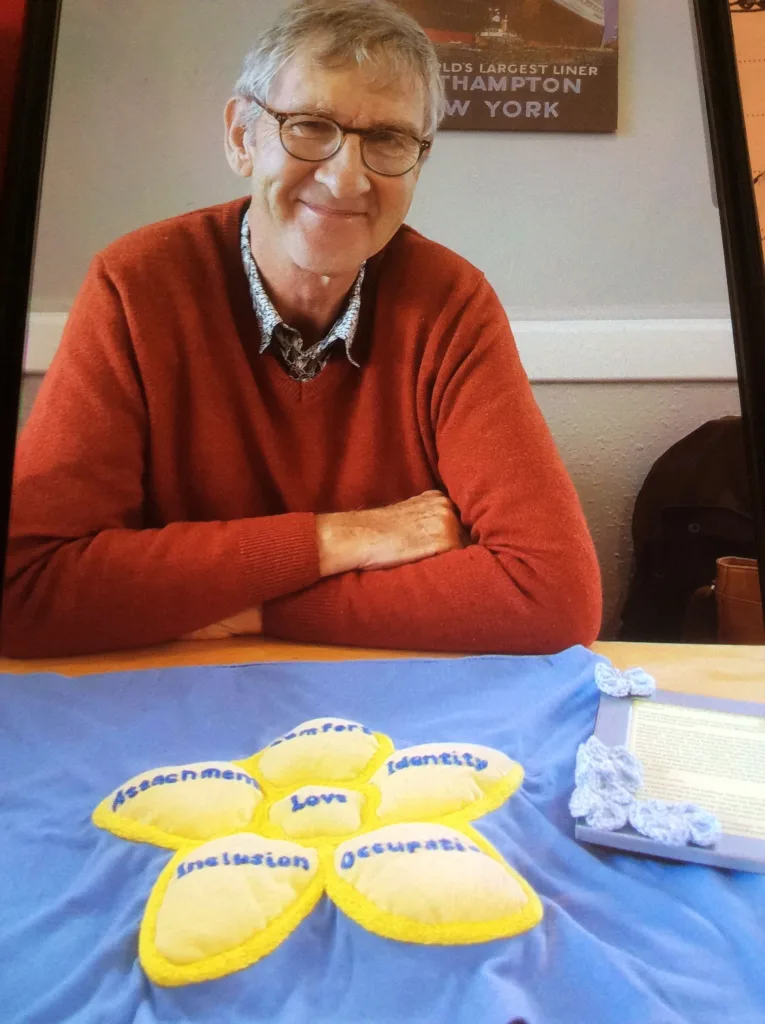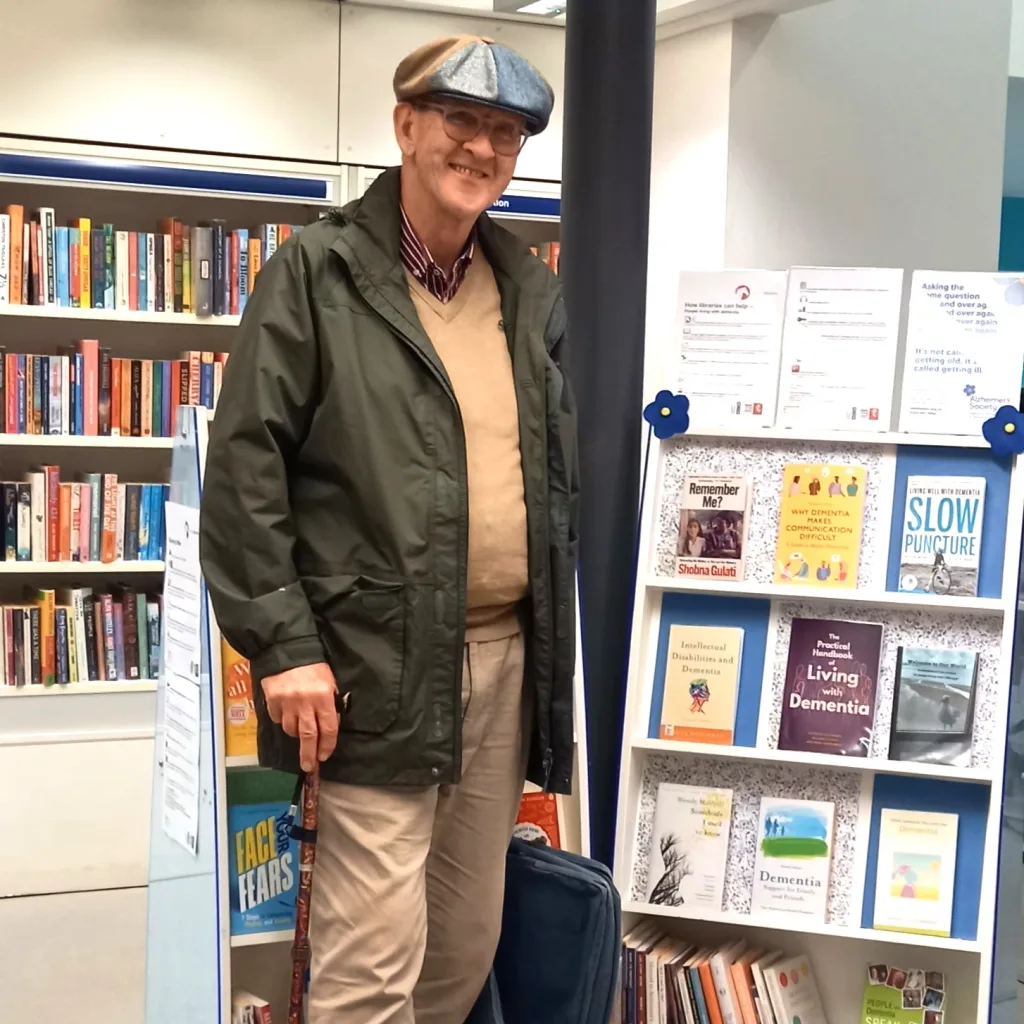Keith’s story: Reading Well for dementia
Reading Well for dementia recommends helpful reading for people affected by dementia. Keith, a member of our book selection panel, shares his experience of reading, dementia and his involvement in developing Reading Well for dementia.

My name is Keith and I live in Canterbury. Until 2011, I was a head teacher of a large primary school, I was a local authority adviser and I was undertaking a Master’s at the local university. But all that came to a close, because at the age of 55, I was diagnosed with Alzheimer’s disease.
I’ve had a deep attachment to books throughout my life. I read for pleasure myself, and I read for information, but I find it more difficult as I struggle to remember what I’ve read. But I take from whatever I’ve read how it made me feel. So if I’m reading a novel, and I’m struggling with the plot, or the characters, as long as I enjoy it, that’s all I want from it.
Reading for information
“Information is power”
When I was first diagnosed, I had very little idea of what dementia was. I thought it was just over 75’s who got it, I’d never met anyone aged 55 with dementia. And I certainly didn’t know anything about early onset dementia. I wanted to learn more because I had the mantra that information is power. So I read lots of books about dementia, which helped me learn.
If it’s a book written by someone with dementia, then I have that sense of connection to it and I can recognize similarities in their stories, but also differences as well. Which is really important to take from a book of that sort.
I am currently a co-editor of a new book series on dementia, being published by Open University Press, McGraw Hill. I’m also the lead author for the sixth book in the series. I’ve been reading every book and giving feedback to the authors alongside the professor, who is my co-editor.
Experience on the selection panel

My attachment to The Reading Agency goes back several years. I first worked as an advisor with them on the initial books on prescription list, back in 2015.
I was then invited to join the advisory group for the Reading Friends project which I really enjoyed.
I had the privilege of going along to speak about the project when it launched at the British Film Institute. I was also invited to World Book Night event a few years ago which made me feel part of the family.
And then a year or so ago, I was delighted when I received an invitation to be part of the Reading Well for dementia book selection panel. I immediately said yes – it was an honour to be asked.
I’ve really enjoyed the experience of it. I’ve enjoyed reading the books that were considered. I’ve enjoyed the advisory group of professionals and academics where I sit and I feel comfortable. I’ve also enjoyed the service user group led by Rachael Litherland, Co-Director of Innovations in Dementia, which hosts the DEEP network (a UK wide network of over 80 involvement groups of people with dementia).
I think the final book list is excellent. I’m happy and proud to stand by it. There’s a very useful blend of personal experience as well as books written by professional authors and academics.
If I had to choose a favourite book on the list, I probably would say Wendy Mitchell’s Somebody I Used to Know, because it strikes the closest chord to me. It strikes the closest chord, to many hundreds of people. So many people have benefited from the book after hearing about it through Wendy’s blog and the media, it’s phenomenal. And I think there are certain books, which do change the landscape. And that’s one of them. It would have been a real travesty if that one hadn’t made the list. And Wendy had three books considered for the list and a few of us were really keen that particular book was included, even though it’s the oldest of the three, because it’s timeless. And of course, we’ve now got the added incredibly sad event of her passing away, so it’s even more important for her work to be recognised.
“We read to know we are not alone.”
C.S. Lewis
I always go back to the C.S. Lewis quote, which is “We read to know we are not alone”. And that is so true. You know, I get an enormous amount of pleasure out of reading, and I’m immersed in the book when I’m reading it, but then I love talking about it with people. And I love people talking about their books with me.
A book that changed my perspective
I read a book called Dancing with dementia, by Christine Bryden, published in 2005. And that changed the way I looked at dementia completely. Because here we had an academic living in Australia, who was diagnosed a bit younger than me, and was living reasonably well, and chose to call her book Dancing with Dementia. Well, when you’ve just been diagnosed, you don’t really think you’re going to dance with dementia, you think you’re just going to die with dementia. So that really was quite transformational. And for a book to be transformational, is rare. And that was transformational for me.
Reading other people’s experiences of the lived experience, both as a family carer, and as a person with dementia, does help to know that you’re not alone. And you’re not the only one experiencing these horrible things. But at the same time, there’s also that reinforcement that they are different as well. And your experience is different. So you take from those books, the similarities, but also you draw some strength from the fact that you’re different as well.
Explore the Reading Well for dementia scheme here.
You can be part of changing life stories
If you’d like to help us continue our work in supporting those living with dementia, please consider donating today.
